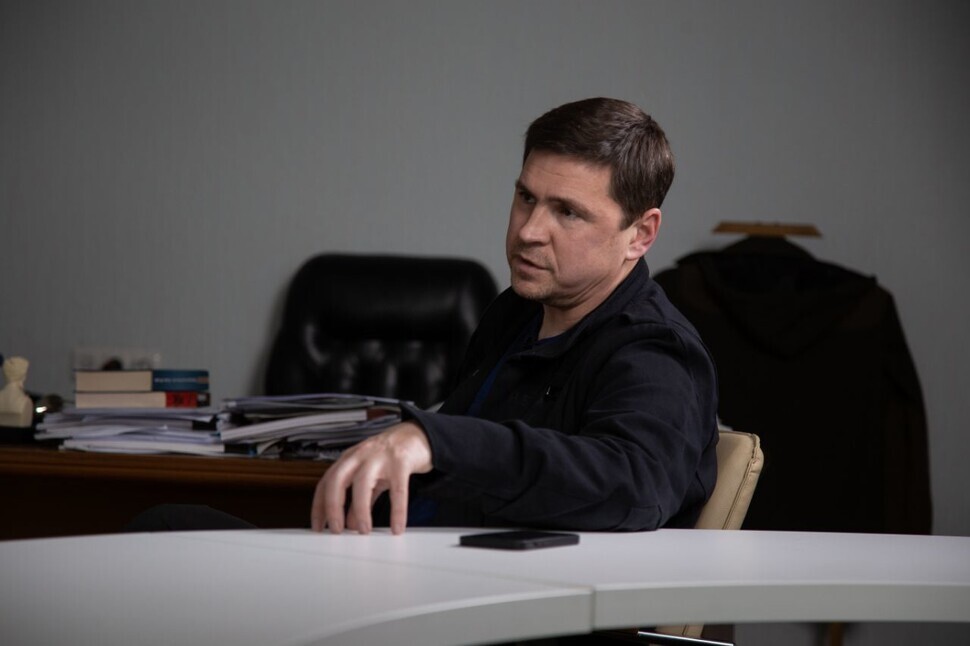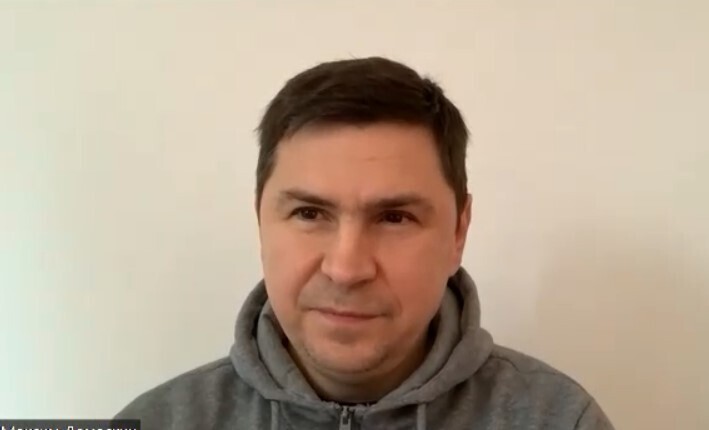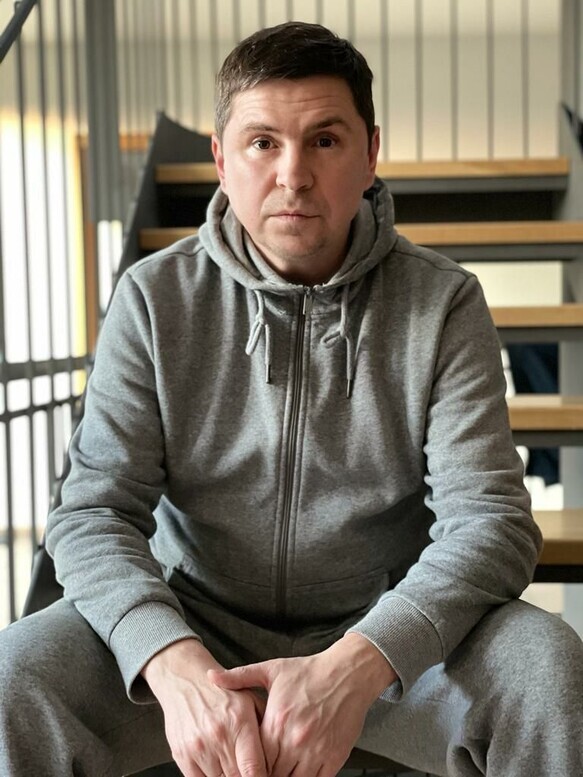hankyoreh
Links to other country sites 다른 나라 사이트 링크
[Exclusive] Top Zelenskyy aide predicts end to war by summer 2023

Mykhailo Podolyak, 50, a close associate and advisor of Ukrainian President Volodymyr Zelenskyy, has been one of the most widely quoted figures in global news media with his commentary on the current war in Ukraine.
On Jan. 2, he took part in a videoconference interview with the Hankyoreh from Kyiv. According to his analysis, Ukraine, which has “many powerful partners, like the USA, Great Britain, EU, Japan, and so on,” is in an advantageous position over internationally isolated Russia with “a lot more resources available.” He also predicted that a consideration of "all the numbers of this war [and] the logic of it" suggests it could be over as early as “the first half of the year, before the summer.”
Podolyak further asserted that the same kind of long-term political division seen with the "Korean Peninsula model" could not be applied to Ukraine. He named three conditions for an end to the war: the complete withdrawal of Russian forces from Ukrainian territory (including Crimea), a halt to missile and drone attacks on Ukraine, and the handing over of war criminals for a special tribunal.
Hankyoreh (Hani): Some are predicting the Russian forces could mount a large-scale counterattack early this year. What do you see happening early in 2023?Mykhailo Podolyak: We anticipate that we can expect two or three more massive strikes — not likely that they can do more than that. Also, there are Iranian drones that Russia is using to strike Ukraine. But they have turned out to be not as effective as in the beginning. They have many of those left, but their effectiveness is quite low. Our air defense has adapted, and they know how to fight those drones.
Russia is only attacking civilian infrastructure. They aren't striking any military targets, as they claim. They do that because they are running out of ballistic missiles. In order for their missile strikes to hit targets, they have to be 70 or more rockets. Then the strike can have some effect. But they do not have them in enough supply for that, especially if we talk about accurate rockets.
Hani: For the past two or three months, there has been barely any movement on a front extending for 1,000 km. Can this be seen as a deadlock?Podolyak: No, I would not say so. Right now, it is crucial for us to stabilize the front line after the successful liberation of big chunks of the Kharkiv and Kherson regions [between September and November]. We need to accumulate more artillery and rockets, get our logistics and supply chains closer to the actual front line, in order to prepare for a further counteroffensive. Also, we are in the middle of talks with our partners about getting long-range missiles. It is very important, since Russia moved back their ammo storage and supply lines by more than 80 km.

Hani: As the war has gone on for over 10 months, the Ukrainian government’s conditions for peace negotiations have become more stringent. In March and April of last year, the conditions were to return things to how they were before Feb. 24. [The last talks took place in Istanbul on March 29.] Does that offer no longer stand?
Podolyak: The plan to return to the borders from before Feb. 24 is no longer valid. This is a war against the civilian population. When we saw all the crimes that Russia has committed on our land, the format of the end to this war changed drastically. We understand that if we don’t liberate the whole territory of Ukraine, we will always have the next stages of this conflict. Then it will be impossible for us to return our citizens who had to leave the country because of all this. We won’t be able to attract investors, because nobody wants to invest in a destroyed country that is constantly in a state of war. If Russia doesn’t lose this war, then they cannot be punished for all those war crimes, for the thousands of civilians killed and the thousands of pieces of civilian infrastructure destroyed. They won’t pay the reparations.
Hani: Is it realistically possible to recover the Crimean Peninsula?Podolyak: After 10 and a half months of war, we see a different Russia [from the myth of military strength]. We can see an army with very poor tactical training and weak strategic capabilities at the level of their general staff. Also, there is strong demoralization in Russian society. On the opposite side of that, there is Ukrainian society and the consensus that we have to liberate all of our territory. If we take into account all the numbers and data and consider the capabilities of Russia — which at the moment is on its way to becoming a pariah state — and compare it to Ukraine, which has many powerful partners, like the US, Great Britain, the EU, Japan and so on, then in terms of a long war — and by long, I mean six to eight months — we have a lot more resources available.
Hani: What would be the conditions for a cease-fire or an end to the war?Podolyak: There are three main conditions for the end of this war. Those are the complete withdrawal of the Russian forces from the territory of Ukraine, including Crimea; stopping of missile and drone attacks on the territory of Ukraine; and the initiation of talks on the matter of handing over war criminals for a special tribunal. I would say that the first two are the preconditions that enable any negotiations at all.

Podolyak: I can assume it will take about one and half to two months to install them, if there are no further complications. There are two main goals. The first is to close up the airspace completely. While at first our foreign partners were quite skeptical [about Patriot support], fearing that this might escalate the conflict, today this issue is fundamental. The philosophy has changed. All of our partners support this one thought, which President Zelenskyy often emphasizes: if we stop Russia and defeat them in Ukraine, this is the only thing that can localize this conflict and keep it inside Ukraine. That will keep Russia from spreading this war to other countries.
Second, one of the ways Russia is fighting its war is fighting not against the military, but against ordinary civilians and civilian infrastructure, including critical energy infrastructure. Closing off the airspace will allow us to protect ourselves from the key doctrinal part of the Russian war effort — missile and drone attacks on our territory.
In negotiations [with partner countries], we’re discussing the delivery of armored vehicles, drones, long-range ammunition for our rocket artillery, and additional capabilities for our traditional artillery. The first part — closure of the airspace — is almost complete, and we’re close to having an ideal air defense. As for the counteroffensive, our negotiations right now are on a completely different level than they were before. We’re very close to reaching some agreements.
Hani: What happens when it becomes difficult to receive the same full-scale Western support as now?Podolyak: I don’t see any possibility of refusal to help Ukraine. Without a doubt, we’re going to receive all the support we need, even in larger quantities.
Hani: There have been recent reports about the Ukrainian military striking against Russian territory. Do you have any plans to go beyond defense and carry out strikes on Russian territory?Podolyak: Ukraine officially is not related to or responsible for whatever happens in the territory of the Russian Federation. In my opinion, what we see happening there means only one thing: The war has come back to Russia. They are experiencing an increase in industrial incidents and sabotage. Why? They are losing control of their power hierarchy.
Hani: Some experts and members of the foreign press have predicted Ukraine could follow the same armistice model as the Korean Peninsula. Do you think that’s possible?Podolyak: In the case of Ukraine, such a model is impossible. If you consider who has the initiative on the battlefield, agreeing to such a model would look foolish.
Hani: When do you expect the war to be over?Podolyak: I wish I could name the exact date. But I think that the war will be over during 2023. I believe in the first half of the year, before the summer or somewhere in the middle of summer. That is if we consider all the numbers of this war, the logic of it. We see the growing inability of Russia in terms of resources.
By Noh Ji-won, Berlin correspondent
Please direct questions or comments to [english@hani.co.kr]

Editorial・opinion
![[Editorial] Penalties for airing allegations against Korea’s first lady endanger free press [Editorial] Penalties for airing allegations against Korea’s first lady endanger free press](https://flexible.img.hani.co.kr/flexible/normal/500/300/imgdb/original/2024/0502/1817146398095106.jpg) [Editorial] Penalties for airing allegations against Korea’s first lady endanger free press
[Editorial] Penalties for airing allegations against Korea’s first lady endanger free press![[Editorial] Yoon must halt procurement of SM-3 interceptor missiles [Editorial] Yoon must halt procurement of SM-3 interceptor missiles](https://flexible.img.hani.co.kr/flexible/normal/500/300/imgdb/child/2024/0501/17145495551605_1717145495195344.jpg) [Editorial] Yoon must halt procurement of SM-3 interceptor missiles
[Editorial] Yoon must halt procurement of SM-3 interceptor missiles- [Guest essay] Maybe Korea’s rapid population decline is an opportunity, not a crisis
- [Column] Can Yoon steer diplomacy with Russia, China back on track?
- [Column] Season 2 of special prosecutor probe may be coming to Korea soon
- [Column] Park Geun-hye déjà vu in Yoon Suk-yeol
- [Editorial] New weight of N. Korea’s nuclear threats makes dialogue all the more urgent
- [Guest essay] The real reason Korea’s new right wants to dub Rhee a founding father
- [Column] ‘Choson’: Is it time we start referring to N. Korea in its own terms?
- [Editorial] Japan’s rewriting of history with Korea has gone too far
Most viewed articles
- 160% of young Koreans see no need to have kids after marriage
- 2Months and months of overdue wages are pushing migrant workers in Korea into debt
- 3[Editorial] Penalties for airing allegations against Korea’s first lady endanger free press
- 4Bills for Itaewon crush inquiry, special counsel probe into Marine’s death pass National Assembly
- 5[Reporter’s notebook] In Min’s world, she’s the artist — and NewJeans is her art
- 6[Guest essay] Maybe Korea’s rapid population decline is an opportunity, not a crisis
- 71 in 3 S. Korean security experts support nuclear armament, CSIS finds
- 8S. Korea discusses participation in defense development with AUKUS alliance
- 9Cracks found in containment building of UAE nuclear power plant built by S. Korean companies
- 10Trump asks why US would defend Korea, hints at hiking Seoul’s defense cost burden